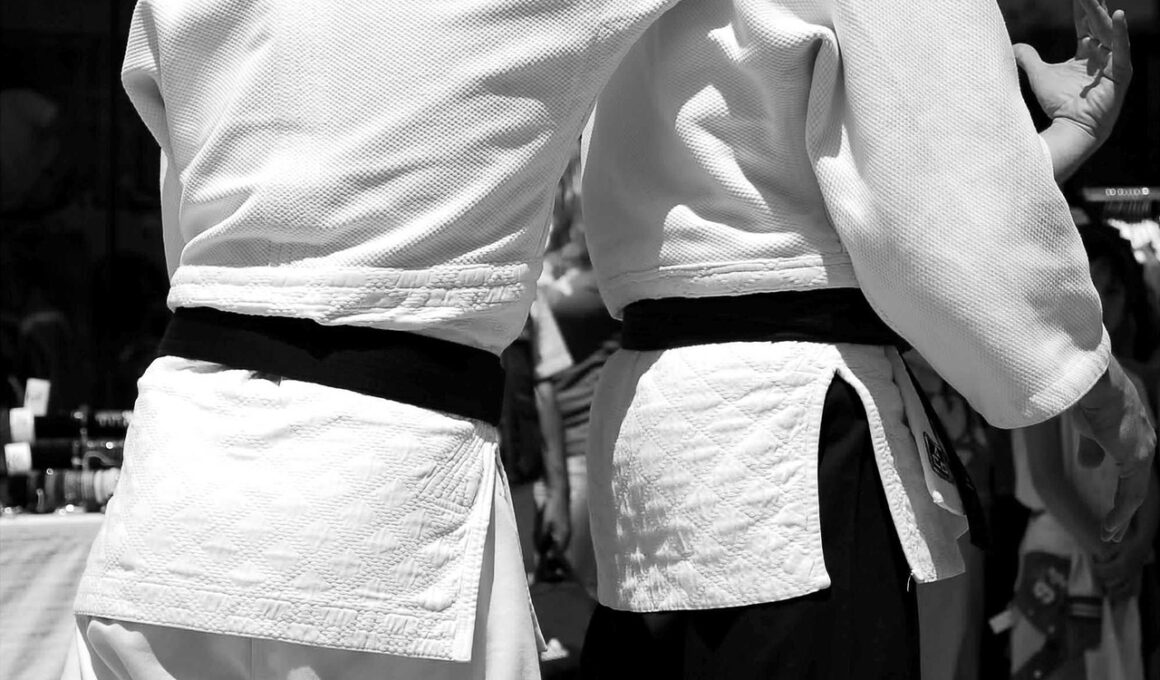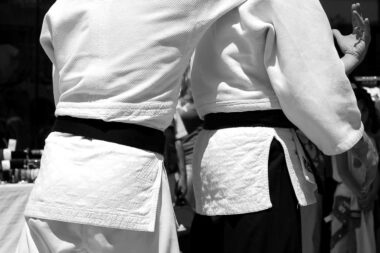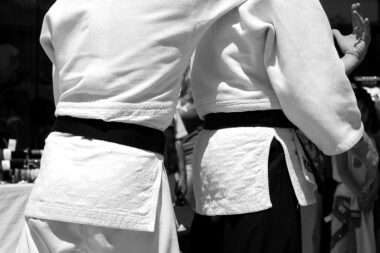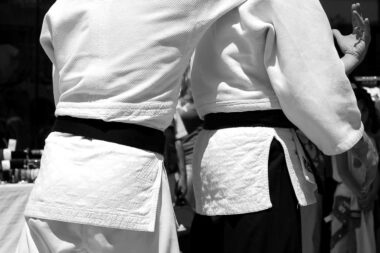How Aikido Enhances Physical Fitness and Mental Health
Aikido, a Japanese martial art, has gained recognition not just as a self-defense technique but also as a means to improve overall physical fitness and mental well-being. Practicing Aikido involves a series of movements that emphasize fluidity, balance, and coordination. These movements require participants to engage their core and various muscle groups, promoting strength and flexibility. Regular training helps practitioners develop endurance and improve cardiovascular health as well. Practitioners often find themselves able to perform everyday tasks more efficiently due to the increased physical awareness that Aikido fosters. Additionally, Aikido’s focus on harmony and non-violence helps create a peaceful mindset, relieving stress. This dual approach makes it excellent for those seeking a holistic fitness routine. Mental health benefits are equally significant, with studies suggesting that engaging in martial arts can boost self-esteem and reduce anxiety levels. Over time, Aikido may also enhance one’s ability to remain calm under pressure, teaching valuable life skills applicable beyond the mats. Ultimately, Aikido serves as a unique pathway combining physical fitness with mental resilience, embracing both body and mind.
Building Strength and Flexibility
One of the remarkable benefits of practicing Aikido is its focus on building strength and flexibility. Aikido techniques heavily involve the use of body mechanics, enabling individuals to apply force effectively while remaining relaxed. This unique characteristic aids in developing muscular strength, particularly in the legs and core, which are vital in executing various techniques efficiently. Aikido training sessions often include both solo and partner exercises, allowing practitioners to push their limits gradually. Flexibility is enhanced through the diverse movements that require stretching and maintaining different postures. Improved flexibility not only helps reduce the risk of injuries but also promotes faster recovery times after strenuous workouts. In Aikido, mastering the art of falling safely, known as “ukemi,” is crucial. This skill not only fosters greater body awareness but also encourages overall agility and balance. The impact of enhanced physical attributes such as strength and flexibility contributes positively to one’s self-image. As practitioners continue to improve, they often find greater motivation and drive in various aspects of their lives, reinforcing the connection between physical fitness and personal empowerment.
Moreover, Aikido practice incorporates significant mental focus, which is pivotal for mastering techniques. Each movement demands deep concentration, encouraging individuals to connect with their bodies and the environment. This mindfulness aspect allows practitioners to learn how to remain present during challenges and helps diminish the overwhelming clutter of everyday stress. Achieving mastery in Aikido requires patience and discipline, instilling values that extend beyond the dojo into daily living. The practice of Aikido cultivates a serene mindset that promotes relaxation and emotional stability. Furthermore, the supportive atmosphere common in Aikido dojos nurtures confidence by providing a platform for personal growth without aggressive competition. Participants are guided to appreciate each other’s strengths, often forming strong community bonds. Their shared aspiration for improvement leads to making friends and expanding social circles, further enhancing mental well-being. Practicing Aikido can effectively counteract feelings of loneliness and isolation as friendships flourish within this collaborative space. Through these interactions and experiences, Aikido opens doors to emotional health that can radiate positively in broader life contexts.
The Philosophy Behind Aikido
The philosophy of Aikido heavily influences its practice and reflects a commitment to peaceful conflict resolution. Unlike many martial arts focused on defeating opponents, Aikido aims to neutralize aggression gracefully. The principles of blending with an opponent’s energy teach valuable lessons about harmony and respect. By redirecting energy rather than opposing it, individuals learn to approach confrontations with empathy and understanding rather than hostility. This fundamental aspect encourages practitioners to develop emotional intelligence alongside physical skills, contributing positively to mental health. As students deepen their understanding of these principles, they often find themselves adopting a more constructive mindset in various aspects of their lives. The compassionate philosophy of Aikido nurtures values such as patience, tolerance, and acceptance. Engaging in this practice allows individuals to gain awareness of their behavior and its impact on others, paving the way for better personal interactions. Adopting such attitudes builds resilience against the stresses of daily life. Through the philosophy of Aikido, students cultivate values that extend well beyond physical training, creating a holistic framework for improving mental well-being.
In addition to fostering a healthy body and mind, Aikido can serve as an excellent practice for developing self-discipline. Training sessions often involve rigorous practice schedules, requiring commitment and consistency from participants. Such dedication nurtures self-discipline, an essential trait for achieving goals outside of martial arts. Practitioners learn to push through challenges and remain steadfast, enabling personal growth in numerous life areas. The journey involves overcoming obstacles, be they physical or mental, allowing for constant self-improvement. This dedication to self-discipline translates into better time management skills, organizational habits, and enhanced focus. The increased sense of responsibility encourages participants to be accountable for their own actions. Additionally, Aikido promotes ethical conduct among its practitioners, fostering a greater understanding of integrity. Such qualities resonate well in both personal and professional settings, emphasizing the importance of being dependable and trustworthy. By cultivating self-discipline, individuals often uplift their self-esteem and create healthier relationships in all life aspects. The lessons learned through consistent training thus empower practitioners to tackle challenges with confidence.
Self-Defense Skills and Confidence
Another practical benefit of Aikido is the cultivation of self-defense skills, accompanied by a greater sense of confidence. Through training, practitioners learn various techniques that enable them to neutralize potential threats effectively. Aikido emphasizes using an attacker’s energy against them rather than relying solely on brute strength. This technique empowers individuals who might feel physically vulnerable to defend themselves against bigger opponents. As students progress, they gain assurance in their ability to handle threatening situations. This confidence spills over into everyday life, allowing practitioners to navigate social situations more comfortably. Individuals become attuned to their surroundings and develop better reflexes, enabling them to avoid potentially dangerous encounters effectively. Aikido’s focus on conflict resolution and control equips students with the tools to manage not just physical confrontations but emotional challenges as well. By developing assertiveness without aggression, Aikido practitioners often become effective communicators. This newfound confidence offers a sense of empowerment, reducing feelings of fear and vulnerability. The transference of skills learned in Aikido can foster resilience necessary for handling various adversities life may present.
In conclusion, Aikido stands out as a comprehensive martial art intertwining physical fitness improvements with essential mental health benefits. Its holistic approach encompasses strength building, flexibility, and mindfulness, which collectively contribute to better overall well-being. By fostering a spirit of cooperation, participants underline the importance of community and emotional growth. The philosophy of Aikido encourages compassion, emotional intelligence, self-discipline, and conflict resolution. Practitioners not only enhance their ability to defend themselves but also enrich their lives while forming lasting relationships with fellow students. Aikido’s teachings resonate beyond the dojo, creating individuals better equipped for both mental and emotional challenges. Ultimately, engaging in Aikido equips practitioners with the tools they need to lead a balanced life, blending physical health and mental clarity into one empowering journey. By committing to this martial art, individuals embark on a transformative path that nurtures their body, mind, and spirit. As such, it becomes clear why many turn to Aikido for self-improvement. The extensive advantages illustrate the profound impact martial arts can have on various dimensions of life.
The Journey Ahead
As more individuals recognize Aikido’s benefits, the growth of this practice continues to gain momentum. Numerous schools and dojos around the world offer classes catering to newcomers of all ages. This accessible nature encourages more people to try their hand at Aikido, underscoring the inclusivity of the martial art culture. Involvement in Aikido offers a unique opportunity to connect with others who share similar interests while enhancing one’s fitness and mental acuity. With growing communities, Aikido enthusiasts are likely to experience increased motivation and support, creating a nurturing atmosphere for personal development. As individuals become more intertwined with this martial art, they discover that it is not merely about learning self-defense techniques but rather an ongoing journey towards self-improvement and inner peace. In embracing the journey, practitioners commit themselves to lifelong learning, flourishing as they adapt their training to suit their evolving personal needs. Such adaptability highlights Aikido’s relevance in modern life, maintaining its purpose as a pathway for holistic wellness. The future of Aikido promises even greater service to individuals seeking balance in body, mind, and spirit.





